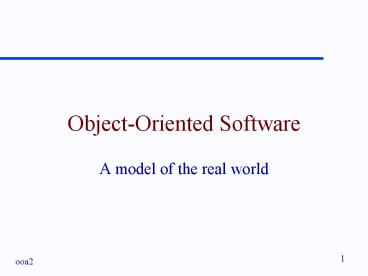Object-Oriented Software PowerPoint PPT Presentation
1 / 16
Title: Object-Oriented Software
1
Object-Oriented Software
- A model of the real world
2
Object-oriented
- Objects encapsulate data and functions.
- The world is modeled by the objects
- each significant object in the world has an
object in the software
3
Object/Class Model
4
Why is OO useful?
- Easier to understand
- Encourages re-use
- Easier to maintain
- Why? - because the objects in the software relate
to objects in the real world and are thus easier
to understand, have cleaner interfaces, are more
stable and are more likely to be needed again
5
OO Requirements Analysis
- Identify the entities/objects in the real world
that need to be modeled in the software. - Many approaches
- classic - draw object model
- Ivar Jacobson - use case first
- I suggest starting with the Noun-in-Text approach
6
Identifying Entities
- Starting with a textual description (e.g. an SOW)
- list nouns
- using domain knowledge
- add other entities
- abstract activities
- levels of abstraction
7
Active Task 1
Tom is starting a dental practice in a small
town. He will have a dental assistant, a dental
hygienist and a receptionist. He wants a system
to manage the appointments. When a patient
calls for an appointment, the receptionist will
check the calendar and will try to schedule the
patient as early as possible to fill in
vacancies. if the patient is happy with the
proposed appointment, the receptionist will enter
the appointment with patient name and purpose of
appointment.
L2S7 - TTYP hardcopy with your names no grade
8
Active Task 2 library 8 min
- Work with one other person and develop the list
of objects and the object model (attributes,
functions, multiplicities) for the following
task. Put your names on the sheet and turn in. - The library has copies of books and patrons.
Patrons can have up to 3 books borrowed at a
time. Each book loan has a due date. Patrons can
renew borrowed books once.
9
Use Case Diagram
- Draw important actors
- Add each action
10
Scenarios
- A description of a sequence of actions
11
Draw Interaction Diagrams
- Vertical lines for the classes
- Use scenario to put in function calls
12
Existence Dependency
- A class (parent) can be associated with a lower
class (child) if - the lower (child) class only exists when the
upper (parent) class exists - each instance of the lower (child) class is
associated with exactly one instance of the upper
(parent) class
13
Measurement is important
14
Time Log - measuring what you do
- Fields
- start (clock time - min)
- stop (clock time - min)
- interruptions (min)
- categories (reading, studying, etc)
- units (e.g. pages of text)
- See page in SOS
15
Example time log
start stop int delta category units
8/21 1640 1730 5 45 reading 10 pages
8/21 2105 2130 25 studying
8/22 0910 1005 14 41 reading 20 pages
16
TL1 (time log) assignment
- Start today
- Turn in Thursday, Sep 5 at start of class
- Name and lab time must be on page
- Include date, hours,min start and stop,
delta,interruptions, categories, units - Determine your average pages/minute
- Pressman pp1-52, and any other course related
reading

